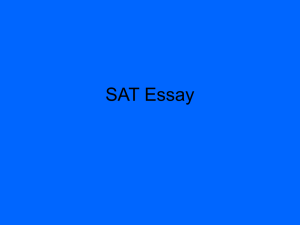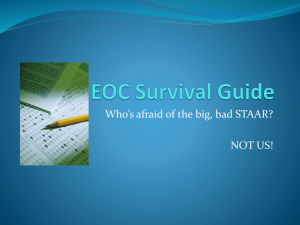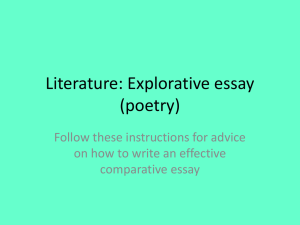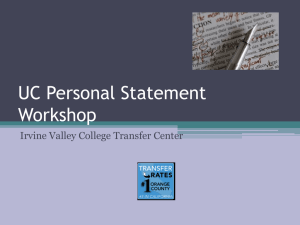Poetry Essay Study Guide by Ralph and Laura
advertisement
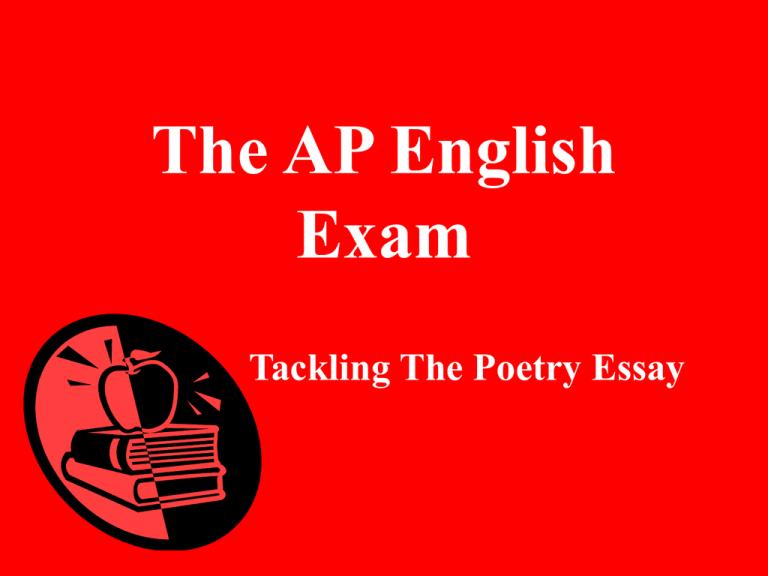
The AP English Exam Tackling The Poetry Essay • The purpose of the poetry essay section of the AP English examination is to see how well the test taker can critically break down a poem and search for key elements such as Author's purpose and certain literary techniques that allow the poem to grow and spread the author’s message. For Example author’s like Robert Frost (used on the AP Exam) much of his poems involve personal affairs and messages that he has used in his poems to empower the writing. The prompts are the key to writing a well developed essay that should include a clear analysis of the prompt. From the 2002 Poetry Essay Question the prompt was from the work: “The Convergence of the Twain” (Thomas Hardy)Prompt: Read the following poem carefully. Then, taking into consideration the title of the poem, Analyze how the poetic devices convey the speaker’s attitude toward the sinking of the ship. This Prompt is clearly asking for an interpretation of the Author’s attitude or tone which is connected to the poem as a whole because discovering the attitude of the author is key to developing a feel for his purpose and how is perspective is elicited within the poem. The best way to understand the prompts is to break them down and focus on what is being asked. You may want to simplify what is being asked so that you can better grasp what the prompt is about. Be sure to always keep the prompt in mind when writing your essay. UNDERSTANDING THE PROMPTS IS ESSENTIAL • • • • • The Poetry essay section of the AP exam expects your essay to meet certain requirements. Use a diverse and intellectual vocabulary to procure your writing. (this shows your coherency of AP level vocabulary and that you know how to apply it to your writing) Be sure to pre write your essay. Write down your ideas in an outline format in order to direct your writing. Be sure you completely understand the prompts and the significance of the poem, remember that most prompts are STRUCTURAL . Their focus is to make sure that you are aware of the literary techniques the author in his/her writing. For example in the 2008B Poem: “Hawk Roosting” (Ted Hughes) and “Golden Retrievals” (Mark Doty) Prompt: The following two poems present animal-eye views of the world. Read each poem carefully. Then write an essay in which you analyze the techniques used in the poems to characterize the speakers and convey differing views of the world. When writing your essay, be sure to make the body paragraphs the details and use evidence from the poem to support your claims, your intro needs to be short and not detailed. The conclusion is just a restatement of the introduction. The Essential Literary Elements • Read the two poems carefully. Then, in a well-written essay, compare and contrast the two poems, taking into consideration the poetic techniques Blake uses in each. This is an essay question in the 2005 exam, in this essay you have to compare and contrast the two poems written by William Blake, which should be easy considering you just have to recognize the differences and similarities between the two versions of “The Chimney Sweeper.” While comparing and contrasting you can also emphasize poetic techniques such as rhythmic patterns, shifts, and alliterations to better describe the connections between the two works. Literary elements are key to understanding the prompt in this question which you will find for most prompts in this section. Always be clear to note the author’s purpose and the context evidence that supports the poem as a whole. The literary elements often included in the poems, such as imagery, diction, and figurative language are major in developing poetry and the faster you identify these elements within the poetry, the better you will be for supporting your claims and connecting lines of the poems to your given prompt. The author’s purpose is also clearly involved in the use of language mechanics, when imagery is used for example, you see the clear ideals the author is trying to get along. The best constructed essay of this section is written by one who understands the prompts thoroughly, quickly identifiies the usage of literary elements, and is clear on the Author’s purpose and how all these aspects tie together to the significance of the poem as a whole. Study Tips • • • • • Review old exams and note similarities in prompts. Be ready to expect prompts in the styles of the years previous. Enhance your vocabulary to build a stronger essay and support your claims and ideas on the prompt in a sophisticated manner. Be sure you understand the author’s purpose for it will help you write your essay and support your claims with evidence from the text related his the purpose. Place the important information and examples in the body paragraphs. Make sure your intro and conclusion are not to wordy and full of detail. Be sure to read your essay over to make sure you clearly identified the prompt and provided adequate examples …AND MOST OF ALL, GET PLENTY OF REST ! • http://homepage.mac.com/mseffie/AP/Poetry _Essays.pdf (Prompts)


